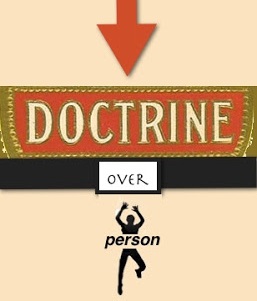Doctrine Over Person
“As members rewrite their own personal history or ignore it, they are simultaneously taught to interpret reality through the group concepts and ignore their own experiences and feelings as they occur. Members learn to fit themselves into the group’s way of life and individuals are valued only as they conform to group doctrine.”
My counselor said that the most hideous evil of the Assembly was that they didn’t let people be who God made them to be. We were supposed to “rejoice always”! Feelings of anger, sadness, or other feelings that weren’t positive were considered unspiritual. We were taught to ignore our feelings and only follow “truth” as they taught it. Obedience, obedience, obedience was drummed into our heads.
Children were constantly taught to obey the smallest and most detailed commands and to ignore their feelings of frustration. Obedience had to be cheerful. Everyone was supposed to behave a certain way.
If a woman were more of a entrepreneur by gift than a cook, she was looked down upon. She might cook all day to bring some food to a fellowship, where she would see someone scowl at her food and throw it in the trash.
If some loved to work with their hands and didn’t spend much time reading their Bibles and preaching, they were unspiritual. If a mother loved teaching her children at home, she was uncommitted to “the work of God.” If someone liked to care for their home, they were distracted.
A child who was handicapped and learned in a different way from others, was looked on as rebellious and his parents not strict enough. If a woman was independent and outspoken, she was unmarriageable. When she hurt because she wasn’t married, she was not trusting God.
People who were perfectionists and reacted slowly to situations were called unfaithful. People, who had their own creative ideas, were ridiculous. Children who asked ‘why?’ were rebelling.
There was no room for being the individual you were created to be. When someone didn’t fit into the groups mold, they were shunned and secretly ridiculed. In this phase of brainwashing, the belief was that the only way to please God was to have the approval of the Assembly leaders.
It didn’t matter how much a person loved God, their family or how much they followed and served Him with their whole heart. If the group wasn’t pleased with someone, then that person wasn’t pleasing God.
Whatever Mike Zach thought of someone became the Assembly opinion of that person. He treated people like they were his best friends to their face, but systematically and carefully tore them down behind their back.
When someone he had gossiped about went to him and told him that they felt others were looking down on them, he would by his innuendos and facial expressions communicate that they were mentally unstable.
Mike often used another Assembly leader named Mark Sjogren as his “hatchet man”. Mike would act like he was someone’s best friend. But when he wanted to put the muscle on them, he would send Mark Sjogren to deal with them.
When the person who was humiliated by Mark Sjogren would come talk to Mike Zach about his mistreatment, Mike would say something to the effect, “Mark will be Mark”, as if he were saying, “Boys will be boys. You can’t stop him.”
He used this method to devastate the men in the group. Following Mike’s direction, Mark was ruthless and vicious in his talks with others. The person Mike actually hurt the worst in these scenarios was probably Mark Sjogren. He made Mark into a cruel man, whom people feared rather than respected. But Mark wasn’t a cruel man when he entered the Assembly.
One young man drew a comparison between the Assembly and communist tactics in China, which he was studying. He pointed out that the communist “struggle sessions,” where they would spend hours talking with people about their faults with the goal of breaking them, was just like the Assembly talks where the goal was supposedly to bring a person to repentance.
Seminars and retreats were similar to struggle sessions. Members would leave these retreats overloaded with a sense of their supposed guilt, sins, and shame and with a renewed sense of dependence on the Assembly and it’s teachings to dig their way out of these problems. They would tell each other what a wonderful time they had that weekend and how thankful they were that God had spoken so clearly to them and brought them under such conviction.

